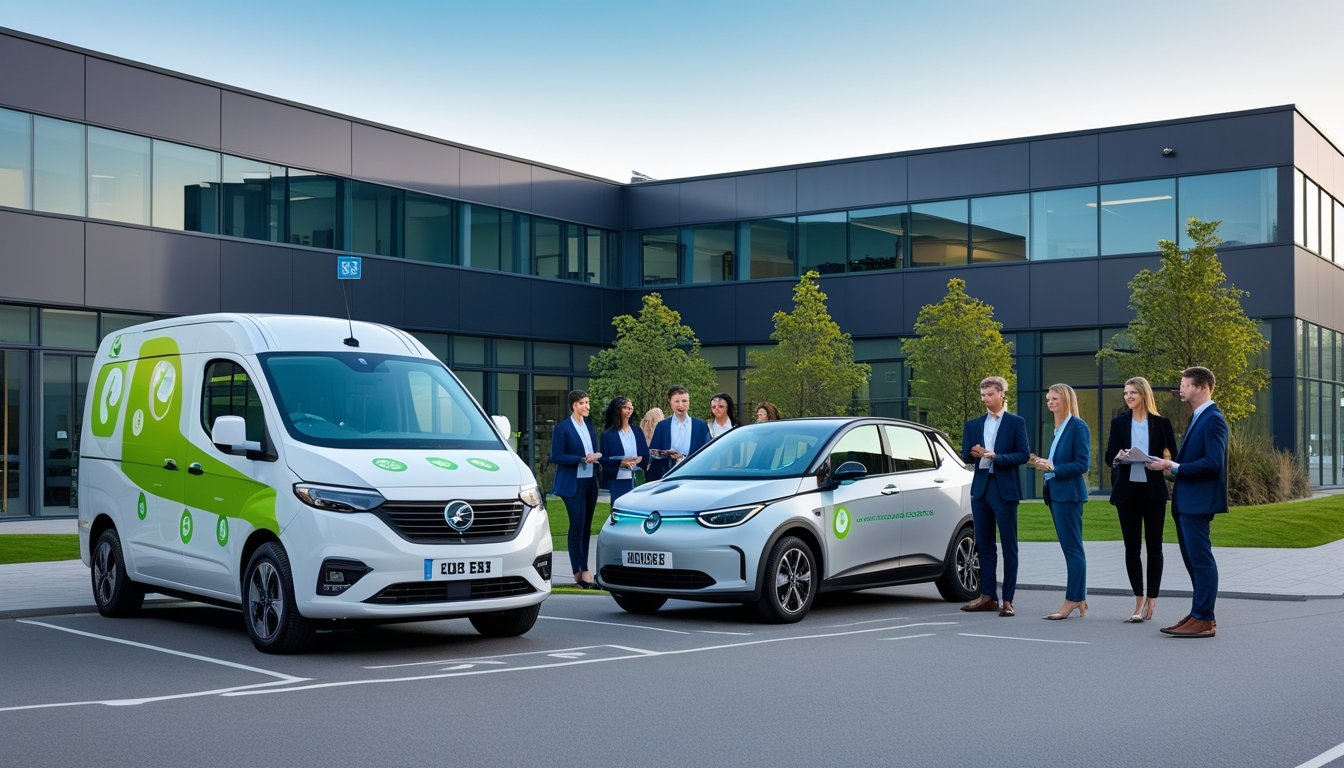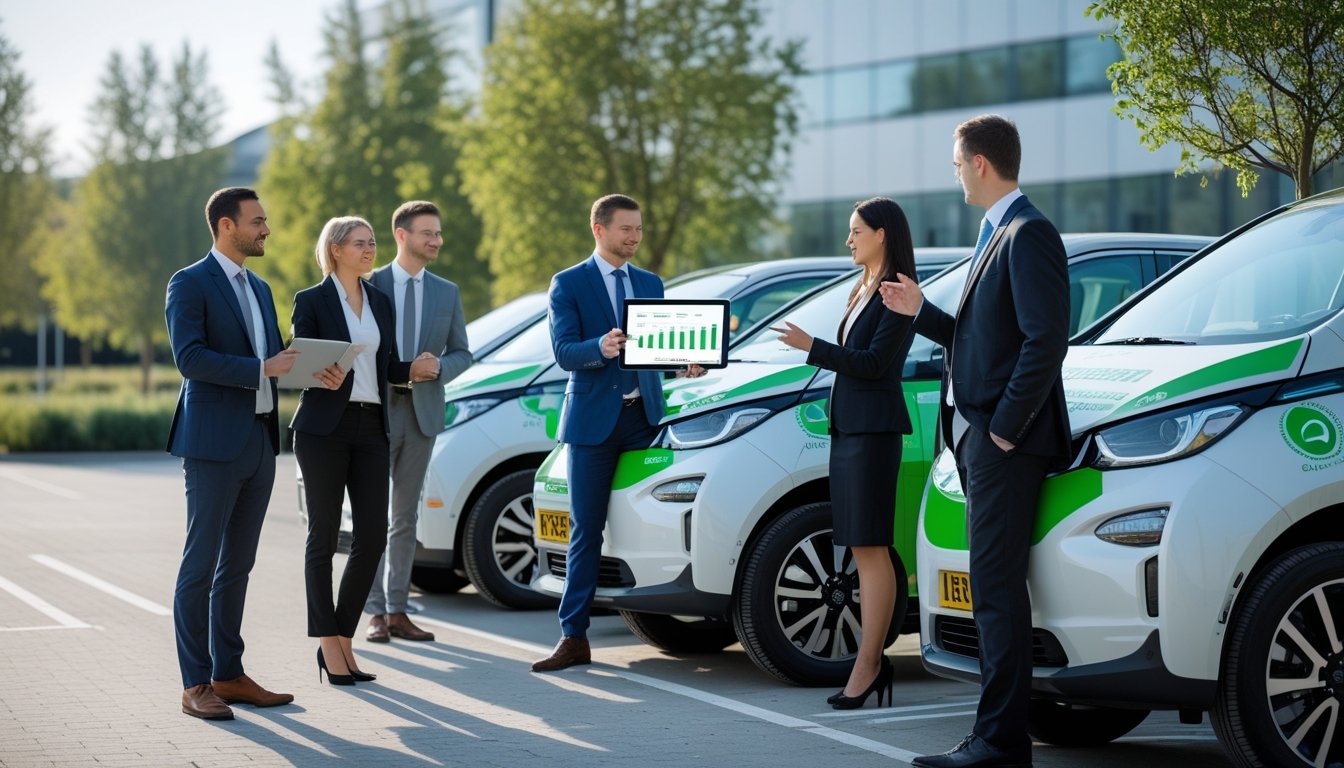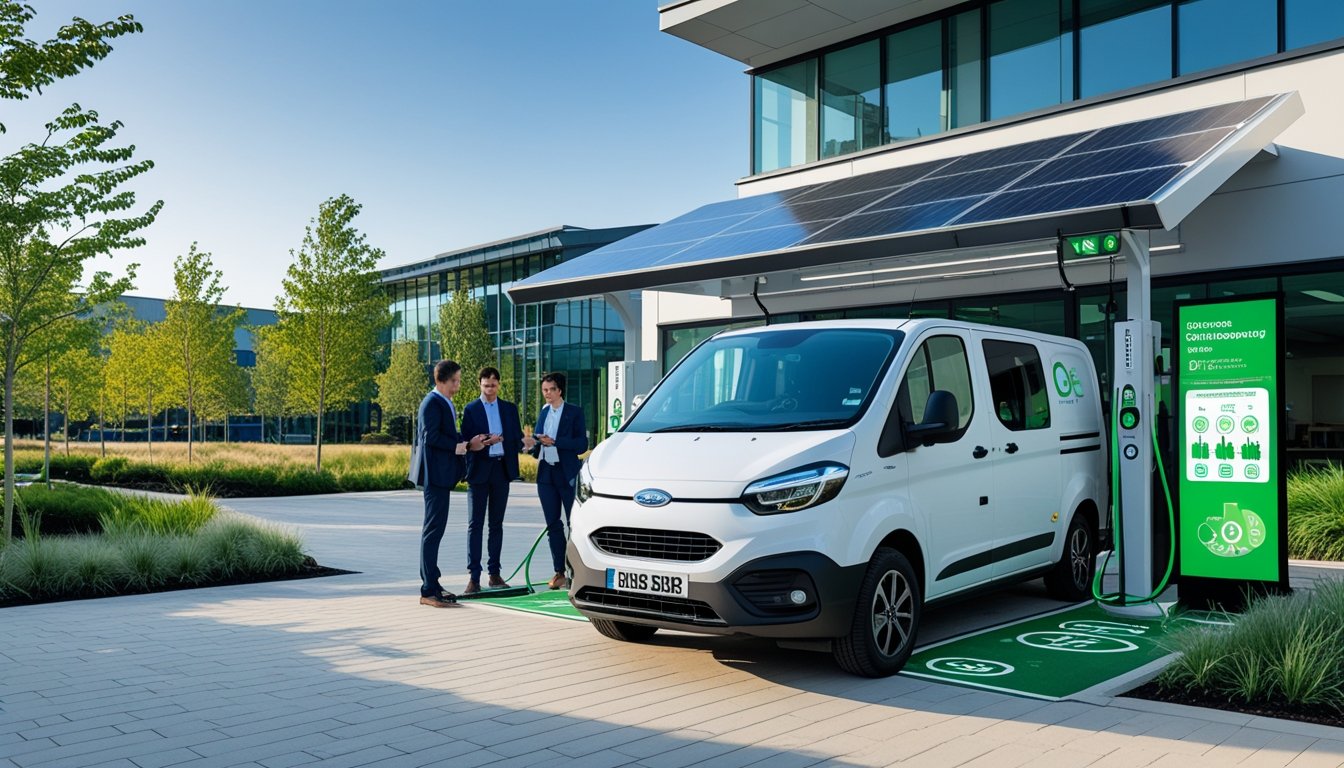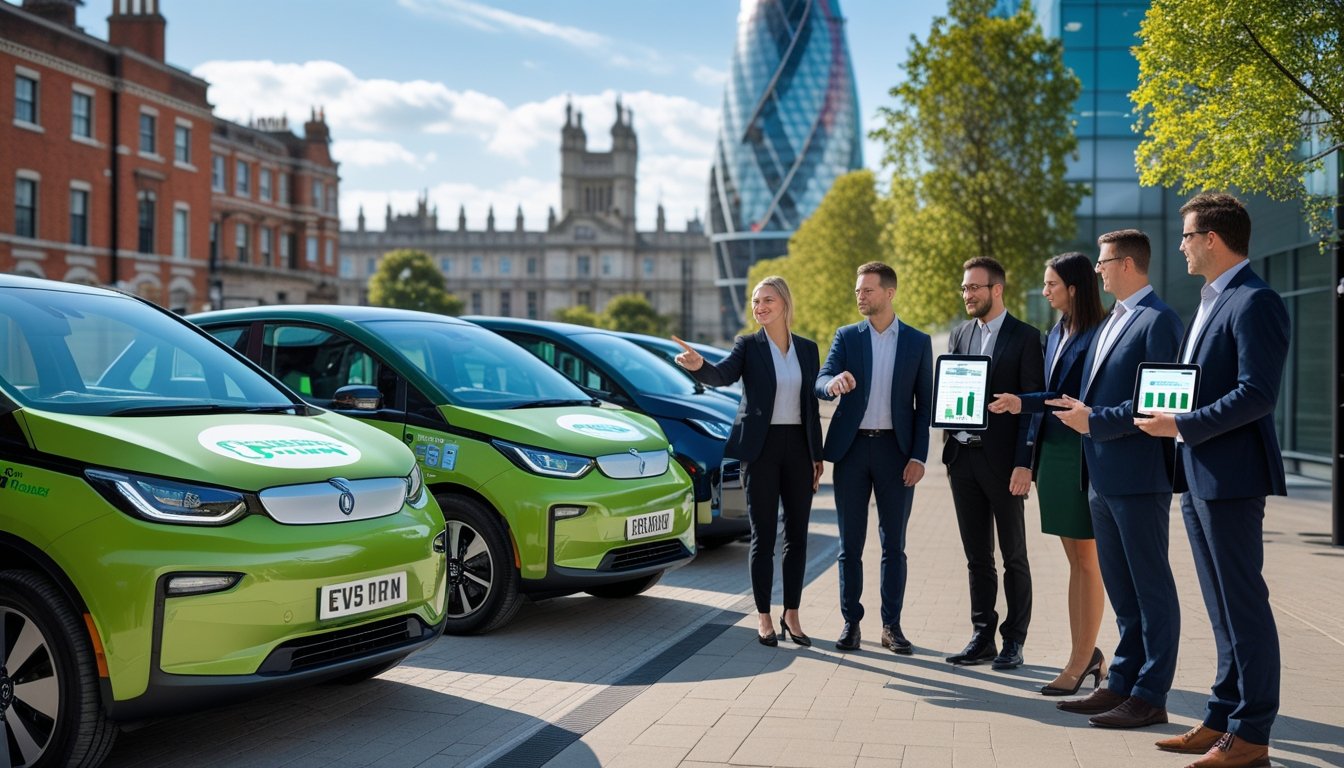Late updated: 06 Jul 2025 12:07
Written by: Amber Collins
Choosing Green Vehicles For Your UK Business Needs: A Comprehensive Guide
Transitioning to green vehicles is an important step for businesses aiming to align with the UK's sustainability goals. Choosing the right electric or hybrid vehicle can help reduce operating costs while minimising environmental impact. With the UK government's commitment to phasing out petrol and diesel cars by 2030, it's crucial for businesses to understand the available options and their benefits.

Electric vehicles (EVs), plug-in hybrids, and other eco-friendly models are transforming the landscape of corporate transportation. For UK businesses, selecting the right green vehicle involves understanding different models and their capabilities, such as range, efficiency, and overall fit for business operations. Many leading manufacturers like Mercedes and Renault are offering state-of-the-art vehicles that suit various business needs.
Investing in green vehicle infrastructure, such as workplace charging stations, further supports the transition. Not only does it enhance vehicle efficiency, but it also assures employees and stakeholders of the company’s commitment to sustainability. Ensuring seamless implementation of these solutions can significantly enhance business operations, helping us lead in environmental stewardship.
Key Takeaways
- Green vehicles reduce costs and environmental impact.
- Choose vehicles based on specific business needs.
- Supporting infrastructure enhances green transition.
Key Considerations When Choosing Green Vehicles For Your UK Business

Selecting green vehicles for a business involves several key factors crucial for making effective decisions. We need to consider our transport needs, different vehicle options, costs, and environmental obligations. By taking a methodical approach, businesses can ensure they are aligning with both sustainability goals and operational needs.
Assessing Business Transport Requirements
Understanding our business transport needs is the starting point for choosing green vehicles. We should evaluate the size of our fleet and the type of journeys made daily. Are long distances covered often, or is our fleet primarily used for short urban trips?
These factors determine whether we should choose electric vehicles (EVs) or low-emission internal combustion engine options. We also need to consider load capacity, especially if our business requires transporting goods. It's essential to match vehicle capabilities with business demands to ensure efficiency and sustainability.
Evaluating Vehicle Types: Electric, Hybrid and Low-Emission Options
Our fleet choices range from fully electric vehicles to hybrids and low emission options. Electric vehicles (EVs) are ideal for zero exhaust emissions and benefit from favourable government incentives. They suit businesses with predictable, shorter travel routes and charging infrastructure access.
Hybrids, combining an electric motor and internal combustion engine, offer flexibility for longer distances. This mix can be advantageous for reducing fuel consumption and greenhouse gas emissions. Low-emission internal combustion vehicles remain an option for specific needs but focus on minimising the carbon footprint.
Analysing Total Cost of Ownership and Savings
Purchasing green vehicles can entail significant upfront investments, yet understanding the total cost of ownership is vital. Let's include purchase price, insurance, fuel/energy costs, maintenance, and tax incentives. EVs often have lower running costs since electricity is cheaper than petrol or diesel.
EVs typically require less frequent maintenance, further reducing costs. As we consider these financial aspects, it is crucial to factor in potential savings from reduced fuel consumption and emissions-related benefits. For instance, zero emission vehicles can deliver long-term financial and ecological savings.
Understanding Environmental Impact and Compliance
Our commitment to sustainability requires we examine each decision's impact on the environment. Electric and hybrid vehicles significantly cut greenhouse gas emissions, aligning with our carbon reduction commitments. Choosing the right vehicle type directly affects our carbon footprint.
Compliance with regulations, such as the UK's Net Zero targets and emerging emission standards, is crucial. Future-proofing our fleet involves staying informed about regulatory changes and incentives. As such, assessing our environmental impact ensures our business both meets its goals and contributes to wider sustainability efforts.
Implementing Green Vehicle Solutions And Supporting Infrastructure

Introducing green vehicle solutions into a business is not just about switching to electric vehicles but also involves setting up supportive infrastructure. It's essential to consider aspects like workplace charging, incorporating renewable energy, and aligning with environmental goals.
Developing Workplace Charging Infrastructure
Establishing robust workplace charging infrastructure is a vital step for businesses looking to adopt green vehicles. It encourages employees to switch to electric cars by providing them with convenient charging facilities. To effectively implement this, assessing the current electricity grid capability is crucial. Some businesses might need to upgrade their power systems to support multiple charging points simultaneously.
Employee engagement is also an essential factor. Encouraging staff to participate in sustainability objectives can increase the adoption of green vehicles. Additionally, offering incentives like reduced parking fees for electric vehicle users can enhance participation.
Integrating Renewable Energy Into Fleet Operations
Utilising renewable energy sources in fleet operations can significantly reduce carbon footprints. By installing solar panels or wind turbines, businesses can generate a portion of the electricity required for charging their fleet of electric vehicles. This not only cuts down on operational costs but also supports the move towards a net zero emissions target.
Monitoring energy consumption and efficiency is vital. Installing real-time energy monitoring systems helps track the energy produced and consumed, ensuring optimal use of renewable sources. Businesses can also participate in grid energy exchange programs to share surplus energy, enhancing community energy resilience.
Supporting Corporate And Environmental Responsibility Goals
Adopting green vehicle solutions aligns closely with our corporate social responsibility (CSR) objectives. It demonstrates our commitment to reducing air pollution and meeting environmental responsibility standards. This transition can serve as a powerful marketing tool, showcasing our dedication to sustainability.
Additionally, aligning with national policies aimed at reducing carbon emissions can open up opportunities for government incentives and support. We should document and report our progress in reducing emissions to hold ourselves accountable and engage stakeholders in our sustainability journey.
Through these strategies, businesses can successfully implement green vehicle solutions that align with broader environmental goals, contributing meaningfully to a sustainable future.
Frequently Asked Questions

Choosing the right green vehicles for a business can greatly affect operational costs and environmental impact. From understanding available incentives to differentiating vehicle purchase options, let's address some common questions about electric and zero-emission vehicle choices for UK businesses.
What are the available incentives for purchasing electric vehicles for businesses in the UK?
The UK government offers financial incentives for businesses investing in electric vehicles. These include grants and schemes aimed at reducing the initial costs of electric cars, which help ease the transition to cleaner transportation.
Which vehicles qualify as zero-emission for company fleets?
Vehicles that produce no tailpipe emissions, such as fully electric cars, vans, and trucks, qualify as zero-emission. These vehicles facilitate compliance with emission standards and contribute significantly to environmental goals.
How does the UK government subsidy for electric cars benefit business owners?
Government subsidies help reduce the cost of purchasing electric vehicles, making them more affordable for businesses. This financial assistance is designed to accelerate the adoption of electric vehicles and support businesses in reducing their carbon footprint.
What tax reliefs are available for UK businesses that invest in green vehicles?
Businesses can take advantage of various tax reliefs, such as reduced company car tax rates. These incentives encourage choosing environmentally friendly vehicles and can result in substantial savings on taxable profits.
What are the differences between business hire purchase and hire purchase lease for electric vehicles?
Business hire purchase involves purchasing a vehicle through instalments, where ownership is transferred at the end. A hire purchase lease is different; it focuses on usage without ownership, often with lower monthly payments. Each option has unique financial implications for the business.
Can businesses partake in a buy one get one free (BOGOF) scheme when acquiring electric cars in the UK?
Currently, no formal BOGOF schemes are available for purchasing electric vehicles in the UK. Businesses can explore bulk purchase discounts and other incentives offered by manufacturers and dealers, which may provide cost benefits for larger acquisitions.
